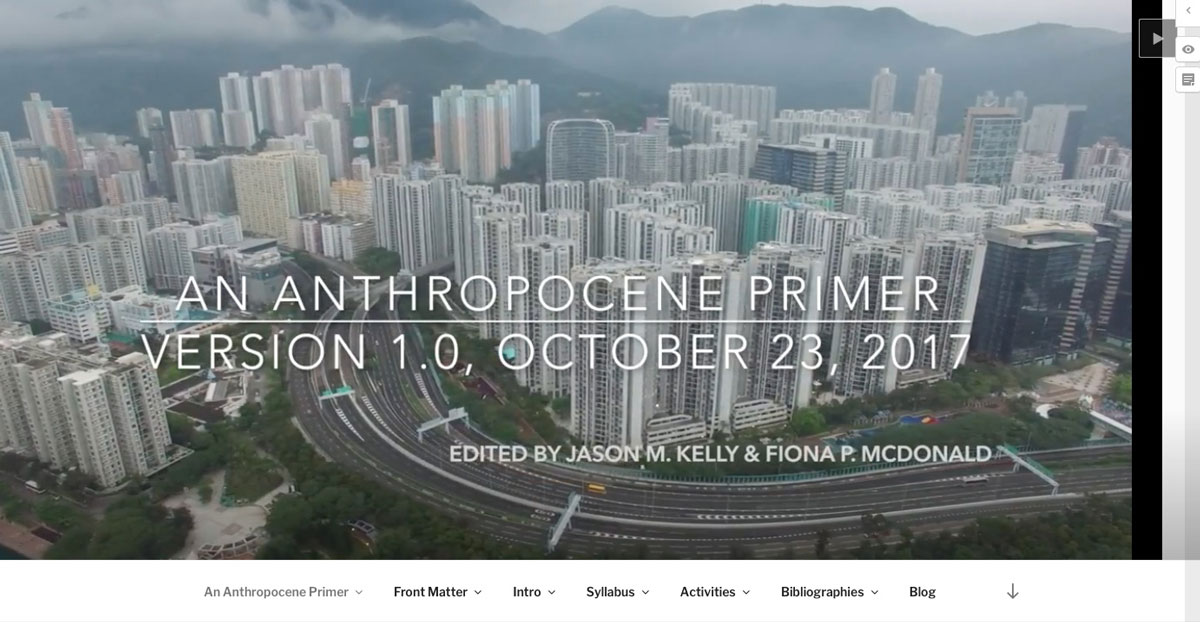Description
An Anthropocene Primer is an innovative open access, interactive publication that guides learners through the complex concepts and debates related to the Anthropocene, including climate change, pollution, and environmental justice.
This born-digital publication (www.anthropoceneprimer.org) is a critical and timely resource for learners across multiple fields from academia, to industry, to philanthropy to learn about issues and topics relating to the Anthropocene, a framework for understanding the environmental change that highlights the human impact on earth systems.
Created for beginners and experts alike – for teachers, self-learners, policy makers, museum directors, funders, and others – An Anthropocene Primer is a guidebook to help make sense of the Anthropocene. Readers can work through it from front to back or dip in as necessary to guide their learning or teaching. The syllabus and bibliography are color-coded for beginner, intermediate, and expert readers. And, the exercises can be completed by individuals or groups.
Finding an entry point into the burgeoning literature on the Anthropocene can be intimidating. Few texts are currently available to guide readers.[1] An Anthropocene Primer seeks to address this gap by highlighting key themes in the literature. It provides an interdisciplinary perspective, drawing together work in the sciences, social sciences, humanities, and arts. Readers can use the primer to get a brief summary of important concepts. They can use it to brush up their understanding of emerging ideas. Or, they can use it to take a deep dive, moving from beginner to advanced readings.
Edited by Jason M. Kelly and Fiona P. McDonald, An Anthropocene Primer emerged from the "Anthropology of the Anthropocene" workshop (www.anthropologyoftheanthropocene.org) hosted by the IUPUI Arts and Humanities Institute in May 2017. The participants from this workshop make up list of authors: Jason M. Kelly (IUPUI, USA), Fiona P. McDonald (IUPUI, USA), Alejandro Camargo (University of Montreal, Canada), Amelia Moore (University of Rhode Island, USA), Mark Kesling (The DaVinci Pursuit, USA), Ananya Ghoshal (Forum on Contemporary Theory, India), George Marcus (University of California, Irvine, USA), Paul Stoller (West Chester University, USA), Dominic Boyer (Rice University, USA), Serenella Iovino (University of Turin, Italy), Rebecca Ballestra (Artist, Monaco/... Eduardo S. Brondizio (IU, Bloomington), Jim Enote (A:shiwiw A:wan Museum and Heritage Center, Zuni, USA), Ignatius Gutsa (University of Zimbabwe, Zimbabwe), Cymene Howe (Rice University, USA), Sue Jackson (Griffith University, Australia), Phil Scarpino (IUPUI, USA). This workshop was funded by the Wenner-Gren Foundation and the Indiana University New Frontiers in the Arts and Humanities grant program.
Objectives and beneficiaries
Research on the Anthropocene has proliferated over the last decade. More and more disciplines have adopted the Anthropocene as a legitimate area of study. With this widespread interest has come a flood of publications, art installations, research projects, and media coverage. For beginners and experts alike, getting a handle on all the work being done on the Anthropocene can feel like drinking water from a fire hose.
We created An Anthropocene Primer to provide learners with an entry point into some of the big concepts and debates that dominate discussions about the Anthropocene. After working through the primer, users will find it much easier to deal with that firehose of information. We designed the primer as a framework to guide individual and collaborative learning. As users encounter new work on the Anthropocene, they will be able to give it context. Terms and concepts that once felt unfamiliar and strange will have meaning and relevance.
Strong points of the solution
We equipped the An Anthropocene Primer with the Hypothes.is, which facilitates community conversations, private annotation, and group discussion in private chatrooms. This will allow collective learning, engagement, and conversation as the primer continues to develop. During the year of this project, we have been using this capability to run an open peer review process. The functionality is described in this video: https://youtu.be/HkRmmfI6xmQ
Expected results and benefits for climate change adaptation and mitigation
Research on the Anthropocene has proliferated over the last decade. More and more disciplines have adopted the Anthropocene as a legitimate area of study. With this widespread interest has come a flood of publications, art installations, research projects, and media coverage. For beginners and experts alike, getting a handle on all the work being done on the Anthropocene can feel like drinking water from a fire hose.
We created An Anthropocene Primer to provide learners with an entry point into some of the big concepts and debates that dominate discussions about the Anthropocene. After working through the primer, users will find it much easier to deal with that firehose of information. We designed the primer as a framework to guide individual and collaborative learning. As users encounter new work on the Anthropocene, they will be able to give it context. Terms and concepts that once felt unfamiliar and strange will have meaning and relevance.
Scalability potential of the solution
An Anthropocene Primer is a living document. We will continue to supplement content that engages new publications, findings, emerging themes, and current affairs. It will also feature items such as podcasts and interviews. It will expand to include more modules and activities for teachers and learners.
Because it is open access and interactive, it has the potential to create a dynamic, international online conversation between students and teachers. It helps scientists communicate their ideas to a broad public, which includes interdisciplinary groups in academic, policy, and educational fields.
[Editor's Note: All information published as submitted by the author(s). Minor edits may have been made for length and clarity.]







